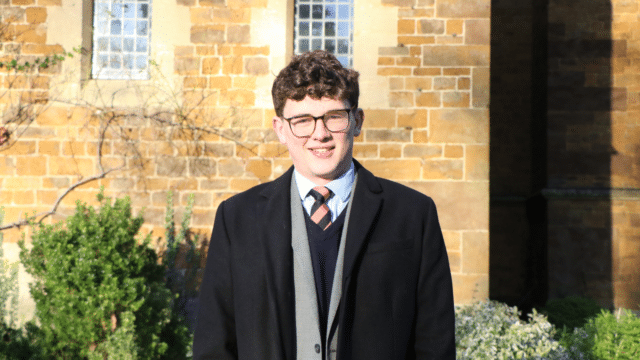
Interview Insights: Arthur’s Cambridge Experience
Upper Sixth’s Arthur opens up about his experience applying to Cambridge University to study Human, Social, and Political Sciences. From extensive preparation to tackling complex interview questions, Arthur sheds light on what it’s like to engage with experts in their field and how he approached the process with confidence and enthusiasm.
How did you feel before, during, and after your Cambridge interview?
Beforehand, there was quite a lot of apprehension. It’s such an uncertain process—you’re thinking about what the questions might be and what the experience will be like. There’s this big mystery surrounding Cambridge, and I remember feeling nervous. In fact, my interview was delayed slightly, which didn’t help!
But once I got into it, I was able to focus on topics I’m passionate about. Talking to people who are experts in their fields felt great, and I’d say the ‘during’ part was probably the best. Afterwards, though, the waiting period is nerve-wracking—you’re constantly wondering how it went.
Can you describe the interview process itself? What sort of questions were you asked?
I had two different interviews with two interviewers, and they lasted about 10 minutes each. Three of the questions in one interview were as a follow up to a presentation that I had pre-prepared and pitched.
In the second interview, the questions were more theoretical. They gave me a situation to analyse and describe, which tied into the course I applied for, as it covers anthropology, sociology, and politics. Each interview focused on different aspects of the course, so they managed to cover a wide range of topics, which was quite fun.
How did you prepare for the interview? Were there specific things you did beforehand?
I did three main things:
- For a few months beforehand, I read extensively around the subject to build a solid knowledge base.
- Closer to the interview, I practised speaking about topics to ensure I could articulate my thoughts clearly. Mr Batten helped with mock interviews, which really prepared me for the process.
- I also sought advice from someone who had gone to Cambridge—they gave me some great insights about what to expect.
What was the most challenging part of the interview? Was there a particular question you struggled with?
The anthropology-related questions were the hardest. For instance, I got one about Rastafarian funerals – I had no idea what I was talking about! – but I tried to link ideas together in the moment, which is really the best you can do in that situation.
What inspired you to apply to Cambridge?
I’d always had an idea of maybe going to Oxbridge, but initially, I thought I’d study PPE at Oxford. Over time though, I realised that economics as a standalone subject wasn’t for me.
When I discovered Cambridge’s Human, Social, and Political Sciences (HSPS) course, I knew it was the right fit. It incorporates politics but also explores society and its impact, which I find fascinating. Plus, Cambridge is such a beautiful place—you can really feel the history and gravity of it when you’re there.
Can you tell us a bit about your academic interests and why you chose your particular course?
My biggest interest is in politics, particularly international politics and how different countries interact. I find the complexities of the Middle East fascinating, especially how different nations’ actions impact societies. I like linking big ideas to their real-world impacts on people, rather than just focusing on abstract theories.
How have your teachers and school supported you during your application process?
The support has been great. I joined the competitive courses group at school, which is for students applying to Oxbridge, medicine, and other competitive fields. We discussed current world issues and linked them to our subjects, which was really helpful for developing the skills needed in the interview.
In geography, I took part in essay competitions and worked on additional projects to stretch my understanding of the subject, which was also incredibly valuable.
What advice would you give to another student considering applying to Cambridge next year?
Start early—don’t leave it too late, because it’s a big process. I found YouTube videos really helpful for condensing complex topics into more digestible pieces of information.
Also, remember that the interview isn’t just about what you know; it’s about how you think. Focus on your reasoning and logic rather than trying to memorise loads of facts. Think about what things mean and how they connect.
What are your long-term goals, and how do you see your time at Bloxham helping you achieve them?
Right now, I’m thinking about becoming a diplomat. I’d love the opportunity to work with different countries and gain international experience—it sounds much more exciting than being confined to British politics.
Bloxham has been great in helping me prepare for this. Through activities like the European Youth Parliament, I’ve practised working with different countries and building relationships, which has been incredibly valuable.
Back to all stories

